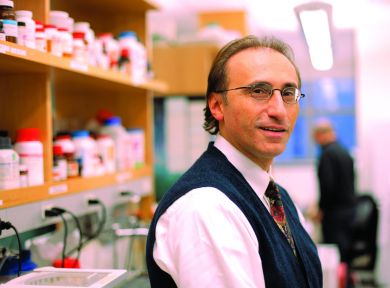Investigating the complexities of cancer biology by studying the transcription factors, cellular signaling events and cellular architecture that underlie malignant transformation.
The biology of cancer cells is different than normal cells. A multitude of aberrant signaling pathways can contribute to uncontrolled cell growth, metastatic potential and lack of response to therapy. Even within the same organ subtype, a vast heterogeneity can exist between tumor cells, which impairs the clinical efficacy of chemotherapy or targeted therapies. The Cancer Biology Program seeks to better understand these complexities by studying the transcription factors, cellular signaling events and cellular architecture that underlie malignant transformation, as well as the interaction of tumor cells with their normal counterparts and surrounding microenvironment. We do this work using model systems, as well as circulating tumor cells isolated from the peripheral blood of patients, providing truly personalized insight into individual patients’ tumor cells and their response to therapy.
Among our focus areas:
- Cytoskeletal signaling
- Mechanisms of drug resistance
- Cell-to-cell communication
Cancer cell metabolism
It has also been established that cancer cell signaling is intimately connected to cancer cell metabolism. Alterations in cellular signaling that drive carcinogenesis dramatically alter cellular metabolism to provide building blocks and cellular energy to support continued growth, proliferation, migration and survival of cancer cells. Reciprocally, alterations in cell metabolism can trigger changes in cell signaling, gene expression and protein synthesis that drive oncogenesis. Moreover, many metabolic enzymes have recently been shown to be mutated or inappropriately expressed in cancer. Our mission is to investigate the unique features of cancer cell metabolism and connections to cellular signaling with regards to cancer initiation, progression, maintenance and therapeutic resistance.
Tumor microenvironment
Comprised of immune cells, blood vessels, extracellular matrices, and chemical and mechanical signals that contribute to tumor growth and metastasis, the tumor microenvironment has begun to emerge as the “Achilles heel” of cancer. It has also become an attractive target for therapy, with anti-angiogenic inhibitors and other drugs targeting various components of the tumor microenvironment making their way into clinical trials. Members of our program integrate cellular, molecular and bio-medical engineering approaches in an investigation of basic mechanisms of interaction between malignant cells and their microenvironment. Focus areas include: angiogenesis, vasculogenesis and lymphangiogenesis; tumor-stroma crosstalk networks; tissue architecture and function; and bone marrow cells and exosomes in metastasis. The program explores pre-clinical and clinical models of several cancers -- including breast, lung, colorectal, pancreatic, ovarian, lymphoma (B-cell, Mantle cell, T-cell), glioblastoma and melanoma – as well as therapeutic resistance, immunology and immunotherapy.
RESEARCH HIGHLIGHT
Corrupted tumor blood vessels spawn cancer stem cells
The tumor microenvironment can determine whether cancer cells become aggressive cancer stem cells that are resistant to treatment and cause cancers to come back after therapy, according to a study by Cancer Biology program members Shahin Rafii, Joseph Scandura, and others. In a paper published in Cancer Cell, they demonstrated that aberrant signals emanating from the tumor microenvironment — specifically the blood vessels that arborize and feed a tumor — serve as molecular triggers to turn cancer aggressive.



